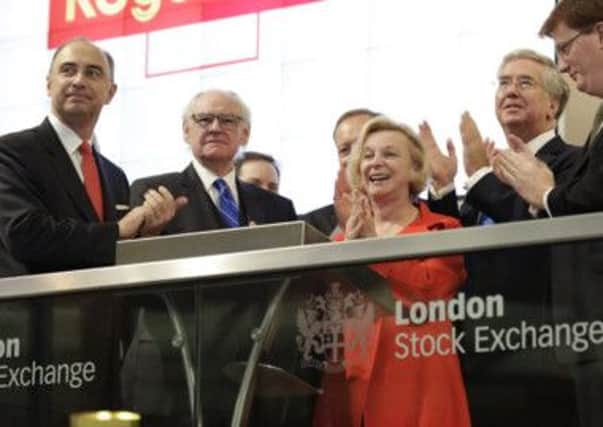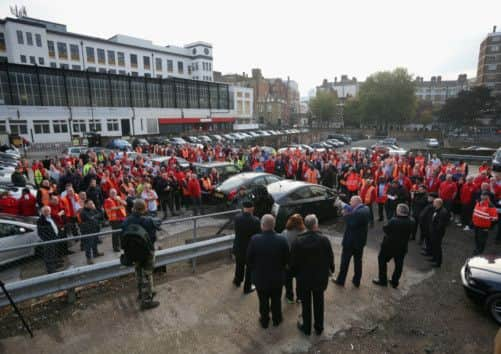MPs recall Cable over ‘too cheap’ Royal Mail sale


Investment bank Lazard will also be questioned by the business select committee over the pricing of Royal Mail and concerns that institutional investors were allowed to buy into the company too cheaply.
The move came as shares yesterday rose to a new peak – almost 50 per cent above the privatisation price before easing back last night.
Advertisement
Hide AdAdvertisement
Hide AdA surge in share prices meant, on the first day of full trading on the London Stock Exchange, that at one stage the company was worth £4.9 billion.


Mr Cable dismissed the steep rise when conditional trading began last week as “froth” but just days later the stock was still increasing, peaking at 490.7p
The sharp increase in share prices has sparked further anger about public assets being sold too cheaply, with Mr Cable under increasing pressure over the sale. He continues to insist the taxpayer has not been short-changed by the privatisation.
The Lib Dem Cabinet minister faces industrial action this winter over the sell-off as well as on-going criticism from Labour about the sell-off.
Mr Cable appeared before the Commons committee last week, when he faced tough questions from MPs over the Tory-Lib Dem government’s flagship privatisation.
The decision to summon Mr Cable, as the cabinet minister responsible for the sale, was confirmed yesterday with the session due to take place next month.
Last night, Adrian Bailey, the Lab-our chairman of the committee, said that early evidence of the share price “vindicated” some of the concerns raised when it quizzed Mr Cable last week.
He said: “It’s fair to say that members of the committee had one view and the Secretary of State had another. The share price movements have vindicated the concerns of the committee members. Let’s see where the price settles.”
Advertisement
Hide AdAdvertisement
Hide AdBut Mr Cable still faces a potentially bitter strike this winter with the Communication Workers Union (CWU) almost certain to announce a strike by postal staff when the result of the union ballot for industrial action is revealed today.
Union officials say they are confident of a yes vote, a move which threatens major disruption to mail deliveries ahead of the busy Christmas period.
The union, which will have to give seven days’ notice of any walkout, has accused the government of “deliberately creating a scramble” for shares, leading to many private investors cashing in their allocation at a big profit.
Dave Ward, CWU deputy general secretary, said: “The Royal Mail share price has soared further, bringing more proof that the company was undervalued by the government’s City mates. The taxpayer has lost over £1bn already in this bungled fire sale of a cherished national institution. Postal workers cannot trade their shares for three years and they are far more concerned about their jobs than the share price.
“We’re confident our members will return a yes vote in the ballot result for strike action, strengthening our position to secure a deal on protecting jobs, services and terms and conditions in the company.
“The share price increase is making profits for wealthy private investors and faceless institutions – it’s not bringing any money into Royal Mail. The investment argument is a clear myth.”
Ballot papers were sent to more than 115,000 Royal Mail and Parcelforce workers in the first national strike ballot in the company in four years.
As formal trading started yesterday shares gained 15p, or 3 per cent, making them almost 50 per cent more valuable than the government’s price tag last week.
Advertisement
Hide AdAdvertisement
Hide AdIn the first day of dealing for many of the 690,000 small investors who bought stock in the highest-profile privatisation for years, shares were up to 490p to value Royal Mail at £4.9bn. That compares with the 330p per share price they were sold for by the government last Thursday, which valued the group at £3.3bn.
The government’s retail offer to small investors was seven times oversubscribed, while demand from big institutions ranging from pension funds to hedge funds exceeded the allocation by 20 times.
Mr Cable had insisted the price of Royal Mail was set on the basis of independent financial advice, taking into account market conditions and similar flotations of other postal businesses in recent years.
He has said people “have to make their own judgments” about how the shares would perform in the coming months.He claimed Labour had been “going around … telling people it is under-priced and they should go out and buy it”.
Questions about the initial share price prompted Royal Mail chief executive Moya Greene to take the unusual step of agreeing with Mr Cable’s comments – in effect implying that her own company was overvalued in the market.
Speaking yesterday, she said Mr Cable’s comments about market froth had “called that one right” as she appeared at the stock exchange with business minister Michael Fallon and Danny Alexander, Chief Secretary to the Treasury, to launch the first full day of trading.
Ms Greene said: “This marks the exciting next phase in our company’s long and proud history. Royal Mail will continue to be an essential part of the fabric of the UK, providing the universal postal service that is cherished by the 29 million households and businesses across the country that we serve.”
She insisted it was a “pivotal moment” in the history of the company following a period when it had been in a “very deep hole”. She also appeared to pave the way for increases to the price of first-class stamps by the newly privatised company.
Advertisement
Hide AdAdvertisement
Hide AdMs Greene said: “We are very proud of the value that we provide for 60p, but we also know that in that field, where we have structural decline on the letters side, we have to be very careful about pricing. We are very pleased that if you compare our prices to other countries in the European Union, if you look in various weight categories between zero and 100g, we are at the low to middle of the spectrum.
“I don’t think you’re going to see a company that is going to be senseless about the pricing lever [but] we [both] need to stay competitive and retain the loyalty of our customer base.”
Ms Greene also referred to the expected strike action when she said: “We need to start thinking about what sort of protections do we need as a company from our people from what has been probably too quick an approach to resort to industrial action? I just think we need to look at alternative ways to resolve disputes.”
A spokesman said Ms Greene was referring to an offer to guarantee staff pay and conditions for three years in exchange for a new framework that would make it harder for workers to go on strike.
‘We may have lost on privatisation but jobs war goes on’
ANGRY Royal Mail employees yesterday attended a rally organised by the Communication Workers Union (CWU) outside a London sorting office.
Hundreds gathered outside the Mount Pleasant office as Royal Mail shares began trading on the London Stock Exchange to protest against the controversial sell off of the organisation.
Addressing the rally, Dave Ward, the union’s deputy general secretary, said: “We may have lost the battle over privatisation, but we are here to fight the war for jobs, services and terms and conditions in Royal Mail and the wider postal industry.
“Privatisation makes the need for a legally-binding deal on jobs more important than ever. CWU is here for the long-term, regardless of who owns this company.”
Advertisement
Hide AdAdvertisement
Hide AdCWU members are expected to back industrial action, with any strike set to be held on or after 23 October – the run-up to the Christmas period.
Ballot papers have been sent to more than 115,000 Royal Mail and Parcelforce staff in the first nationwide vote since 2009. The results are expected to be announced today. The ballot is over pay, job security and terms and conditions.
Last night, Royal Mail said about 100 million free shares have been allocated for employees of the company, giving a total initial market value of approximately £489 million. Each eligible full-time employee in Royal Mail is entitled to 725 shares with an initial market value of £3,545.25.
Under HMRC rules, the maximum value of free shares that can be allocated to an individual employee in any tax year is £3,000.
A total of 613 shares worth £2,997.57 at the closing mid-price today have been awarded to each eligible full-time employee.
Less than 0.5 per cent of 150,000 of eligible employees chose to opt out of receiving free shares.